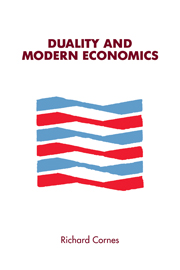Book contents
- Frontmatter
- Contents
- Preface
- PART I SOME BACKGROUND
- PART II MODELING INDIVIDUAL CONSUMER AND PRODUCER BEHAVIOR
- Chapter 2 Individual consumer behavior: Direct and indirect utility functions
- Chapter 3 Individual consumer behavior: Expenditure and distance functions
- Chapter 4 Individual consumer behavior: Further useful relationships and formulations
- Chapter 5 Producer behavior
- Chapter 6 Consumer and producer behavior: More useful topics
- Chapter 7 Consumer theory with many constraints
- PART III APPLYING THE MODEL OF INDIVIDUAL BEHAVIOR
- Epilogue
- Bibliography
- Author index
- Subject index
Chapter 3 - Individual consumer behavior: Expenditure and distance functions
Published online by Cambridge University Press: 11 September 2009
- Frontmatter
- Contents
- Preface
- PART I SOME BACKGROUND
- PART II MODELING INDIVIDUAL CONSUMER AND PRODUCER BEHAVIOR
- Chapter 2 Individual consumer behavior: Direct and indirect utility functions
- Chapter 3 Individual consumer behavior: Expenditure and distance functions
- Chapter 4 Individual consumer behavior: Further useful relationships and formulations
- Chapter 5 Producer behavior
- Chapter 6 Consumer and producer behavior: More useful topics
- Chapter 7 Consumer theory with many constraints
- PART III APPLYING THE MODEL OF INDIVIDUAL BEHAVIOR
- Epilogue
- Bibliography
- Author index
- Subject index
Summary
Chapter 2 introduced a number of axioms concerning consumer preferences. Of these, the first three – reflexivity, completeness, and transitivity – comprise the essence of what we there called rationality on the part of the individual consumer. The fourth – continuity – gives access to the help of some simple optimization theory. A large part of economic theory uses no more than these axioms, together with the last two – nonsatiation and (strict) convexity – in its handling of consumers. Yet, apart from some fairly obvious and not very startling properties obtained directly from the budget constraint, our subsequent discussion of demand behavior in Chapter 2 turned up disappointingly little concerning the properties of demand systems. To have any hope of uncovering further a priori restrictions on demand behavior, we must try a slightly different tack. This is the task of the present chapter.
We begin, in Section 3.1, by identifying a “law of demand” and by suggesting an associated type of function – a compensated demand function – in which money income is replaced by the utility level as an argument. Investigation of such functions reveals further powerful and far from intuitively obvious properties of demand behavior that are direct consequences of the axioms of rational behavior. Section 3.2 introduces the idea that at any equilibrium the consumer is minimizing the cost of attaining his realized utility level at the prevailing prices, and it defines the resulting minimum expenditure function, whose properties are discussed in Section 3.3.
- Type
- Chapter
- Information
- Duality and Modern Economics , pp. 63 - 85Publisher: Cambridge University PressPrint publication year: 1992



